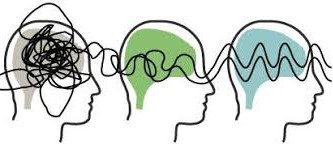
Why We Fail at Being Spiritual OR Religious
I grew up in a deeply religious family, but neither my parents nor my four older siblings were showy about it. My father was a practical sort of guy and rarely, if ever, talked about his faith. But I was impressed as a child that he never went to bed without kneeling to pray, and neither he nor my mother ever missed Sunday mass.
My mother was devoted to Mary, and was also a pray-er. She and my Dad made sure we attended church and received the sacraments and sent us to parochial school, and they were obviously eager for us to know right from wrong and to always choose the former. But I don’t remember them ever saying why they were believers, let alone preaching to us.
All the recent reports of emptying church pews have brought on a slew of articles about what people believe and why. Many have focused on the “spiritual versus religious” controversy; that is, people – especially young people – who say they’re spiritual but not religious.
Self-identify in Four Categories
A graph in a recent edition of the National Catholic Reporter shows a sort of pie chart on people who identify in four categories: “spiritual and religious;” “spiritual but not religious;” “not spiritual but religious;” and “neither spiritual nor religious.”
About half of respondents to the survey the chart illustrates – conducted by the Public Religion Research Institute at the University of Florida in 2017 – identify as either “spiritual and religious” or “spiritual but not religious.” Another 30 percent identify as “neither spiritual nor religious.”
I understand why people would self-identify in these three categories. What I don’t understand is the 22 percent who identify as “not spiritual but religious.” How can you be religious without being spiritual?
All these terms are ambiguous, of course, and self-identification is notoriously untrustworthy. There are probably huge differences of opinion about the terms’ meanings. So just to add a small amount of objectivity to the discussion, here’s what the dictionary says about the meanings of “spiritual” and “religious:”
Spiritual: 1. “Of, relating to, consisting of, or affecting the spirit.” Religious: 1. “Relating to or manifesting faithful devotion to an acknowledged ultimate reality or deity.”
So, theoretically, at least, a person could be spiritual, interested in and relating to the spirit as opposed to just the physical, but not interested in or relating to an “ultimate reality” or deity. But be spiritual and not religious? No religion I know of ignores the spirit.
I say “theoretically” because I believe that although possible, it’s very hard to be spiritual without the help and support of religion and its vast experience in the spiritual. Nonetheless, I know there are lots of people who try it, or at least want to be spiritual, and for those people there is hope they will find God.
I’m sure everyone who rejects God and/or religion has his/her own reasons for doing so. But here are some of the most common reasons I believe people have abandoned religion, at least in western countries: relative prosperity and its accompanying commercialism and consumerism; absence of wars that touch most western people; the influence of modern media, starting in the 1980s with TV shows like Friends and Seinfeld; scandals in the church, especially the Catholic church; and the inability of churches and synagogues to speak to the needs of contemporary people.
Another is the popular notion that there’s an inherent conflict between belief and science. If I’m religious, I can’t be “scientific;” or, if it can’t be detected or measured, it doesn’t exist, pretty much sinking the notion of the “spiritual.”
Reasons of Which Reason Knows Nothing
In his book, “I want you to be: On the God of Love,” Czech philosopher and theologian Tomas Halik quotes the famous mystic John of the Cross as saying that faith is knowledge that “exceeds all human reason,” and St. Augustine, who said, “The heart has its reasons of which reason knows nothing.”
Halik, who has specialized in studying and dialoguing with non-believers, believes that the most common reason for rejecting God is that someone has an idea of God that is psychologically or morally unacceptable for them (that is, the idea of a tyrannical, punitive schoolmaster, associated with childhood traumas and a twisted religious upbringing)….” They reject a caricature of God in the name of human liberty.
Another way of looking at faith, however, isn’t as another word for “belief,” but as a relationship to God and others. And at this time of year when many people are making resolutions, it’s good to remember that it’s hard to blame God for our lack of faith.
Matthew Kelly, author of the book, “Perfectly Yourself,” puts it this way: “Diets don’t fail. We fail at diets. Savings plans don’t fail. We fail at savings plans. Exercise routines don’t fail. We fail at exercise routines. Relationships don’t fail. We fail at relationships.”



